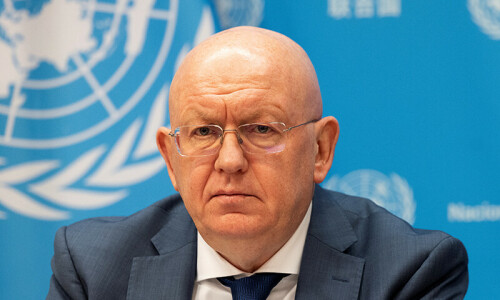ISLAMABAD: A report has called upon legislators to convene a special session of parliament to assess the situation and institute a robust parliamentary oversight of all matters related to Covid-19 in general and deliberations and decision on the choices of the vaccine in particular.
The “Covid-19: monitoring and assessment of pandemic governance” is the second monthly report prepared by Free and Fair Election Network (Fafen).
It suggests that a serious effort for developing a broader consensus with active parliamentary oversight might help bring political legitimacy, focus and transparency to several aspects of the government’s Covid-19 response, including the choice and procurement of the vaccine.
Greater transparency over the government policy and plans for vaccine procurement, costs, priority groups, general market regulation and access will help allay public paranoia and enhance public trust. In addition, the government also needs to proactively address suspicions being expressed by certain quarters over the safety of any vaccine.
Report seeks parliamentary oversight of matters related to virus, deliberations on choices of vaccine
The report stressed the need for developing a much broader understanding and agreement among the political leadership at the national level to curtail the second wave of Covid-19.
“A more focused and integrated effort to reach a minimum understanding among political stakeholders followed by a thorough and well-coordinated awareness and sensitisation campaign, may help the government in putting together a successful Covid-19 response. With government bodies like National Coordination Committee (NCC) and National Command Operation Centre (NCOC) issuing warnings about the rise in Covid-19 cases in the country, the opposition believes the government is using the pandemic for political expediency,” it stated.
The report also identified persisting health-governance challenges at both policy and implementation levels that, if not addressed, may spawn a significant healthcare crisis in the country. The report stated that legislative oversight remained dormant in November with only minimal activity in both houses of the parliament. The few gatherings, which did take place in the parliament, only highlighted the differences between the opposition and the government.
The report is based on data collected through stakeholders’ surveys and direct observation of enumerators deployed in 34 districts. It identified an addition of 35,863 new confirmed cases in November.
The number of infections across the country rose from 333,093 on Nov 1 to 400,482 on Nov 31. The second wave is considered more lethal as the number of deaths also increased by 3,715.
The report also pointed out that a clear and consistent communication strategy was lacking both at the regional and national levels leading to inconsistent compliance in public areas, offices and even health facilities. Capacity to handle the pandemic at the district level remains an issue that engenders significant variance in response by key stakeholders.
Government officials in 30 districts from where data was collected reported sufficient healthcare infrastructure in place, but most representatives of doctors and paramedics’ associations only partially endorsed the statement.
“Health facilities in the districts remain a significant concern as the testing, quarantine/isolation capacity and other provisions such as ventilators are feared to fall short if the rate of infections is not slowed down/checked. Capacity in terms of the numbers and skill set of healthcare providers is yet another area of concern; with as much as 59pc of doctors and 34pc of paramedic representatives reporting that their colleagues were not adequately trained/skilled to deal with Covid-19. Coordination mechanisms established to manage the Covid-19 response during the first phase of the infections early this year largely remained intact in 27 of the 32 observed districts,” it stated.
“The urgency of adherence to SOPs only gets reinforced when contextualised in the global race to procure vaccine - a race that a poorer country like Pakistan does not have the resources to contest. With the government showing reluctance in imposing a complete lockdown and the opposition may have reasons to see the government’s move to enforce SOPs as political maneuvering, Pakistan’s fragile healthcare system is at the risk of crisis. A more serious effort to reach a minimum understanding among political stakeholders followed by a thorough and well-coordinated awareness and sensitisation campaign may help the government in putting together a successful Covid-19 response,” the report added.
Published in Dawn, December 30th, 2020












































Dear visitor, the comments section is undergoing an overhaul and will return soon.